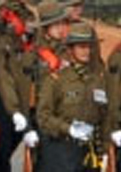Building Army’s Human Resource for Sub-conventional Warfare
- Publisher: Pentagon Security International
This book portrays how the peculiarities of subconventional warfare impact the soldiers and what needs to be done to address the ill effects by various agencies at macro as well as micro level. Specifically, it brings out the methodology to sustain motivation of troops in this special warfare and suggests measures to optimise their stress levels. Through this book, the author has brought out various issues which cause extraordinary stress among army personnel operating in sub-conventional warfare environment.
- ISBN 9788182746039,
- Price: ?. 695/-









